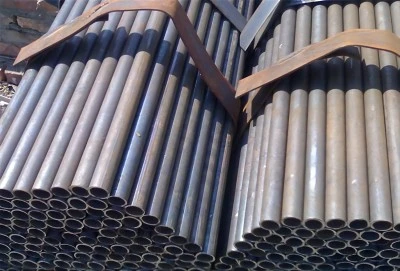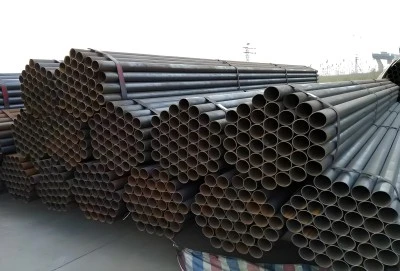Electric Resistance Welded (ERW) steel pipes have become an indispensable component in various industries, from construction to oil and gas. As a leading manufacturer of ERW steel pipes, Hebei Longma Group Limited (LONGMA GROUP) is committed to providing high-quality products and valuable information to our clients. In this comprehensive guide, we'll delve into the intricacies of ERW steel pipes, exploring their manufacturing process, applications, and key considerations for selection.
|
|
|
Step-by-Step Process of Manufacturing ERW Steel Pipes
The production of ERW steel pipes is a sophisticated process that combines precision engineering with advanced technology. Let's explore the key stages involved in manufacturing these versatile pipes:
1. Raw Material Preparation:
The journey begins with the careful selection of high-quality steel coils. These coils are meticulously inspected to ensure they meet the required specifications for strength, durability, and chemical composition.
2. Uncoiling and Edge Milling:
The steel coils are unraveled and fed into a precision edge milling machine. This crucial step ensures that the edges of the steel strip are perfectly straight and parallel, setting the foundation for a high-quality weld.
3. Forming:
The prepared steel strip is then guided through a series of forming rolls. These rolls gradually bend the strip into a cylindrical shape, creating the distinctive tubular profile of the pipe.
4. Welding:
At the heart of the ERW process lies the welding stage. As the formed pipe moves through the production line, high-frequency electrical current is applied to the edges of the steel. This current generates localized heat, causing the edges to fuse together seamlessly.
5. Heat Treatment:
Immediately after welding, the pipe undergoes heat treatment. This process helps to normalize the steel structure, relieving internal stresses and enhancing the overall strength of the pipe.
6. Sizing and Straightening:
To ensure precise dimensions, the welded pipe passes through sizing rolls. These rolls fine-tune the diameter and roundness of the pipe. Subsequently, a straightening process is applied to eliminate any curvature.
7. Hydrostatic Testing:
Quality assurance is paramount in ERW pipe manufacturing. Each pipe undergoes rigorous hydrostatic testing, where it is subjected to high-pressure water to detect any potential leaks or weaknesses in the weld.
8. Non-Destructive Testing:
Advanced non-destructive testing methods, such as ultrasonic inspection, are employed to scrutinize the integrity of the weld and the overall pipe structure.
9. Surface Treatment and Coating:
Depending on the intended application, the pipes may receive additional surface treatments or protective coatings. This can include galvanization, epoxy coating, or other specialized finishes to enhance corrosion resistance and longevity.
10. Final Inspection and Packaging:
Before leaving the production facility, each pipe undergoes a final visual and dimensional inspection. The pipes are then carefully packaged to protect them during transportation and storage.
This meticulous manufacturing process ensures that every ERW steel pipe produced by LONGMA GROUP meets the highest standards of quality and performance.
Key Applications of ERW Steel Pipes in Modern Construction
The versatility and reliability of ERW steel pipes have made them indispensable in numerous industries. Let's explore some of the key applications where these pipes excel:
1.Construction and Infrastructure:
In the realm of construction, ERW steel pipes play a pivotal role in both structural and non-structural applications:
- Structural Support: ERW pipes are frequently used as columns, beams, and trusses in buildings and bridges, providing essential load-bearing capacity.
- Scaffolding: The strength-to-weight ratio of ERW pipes makes them ideal for temporary support structures in construction sites.
- Fencing and Railings: These pipes offer durability and aesthetics in perimeter fencing and safety railings.
2.Oil and Gas Industry:
The oil and gas sector relies heavily on ERW steel pipes for various critical applications:
- Transmission Pipelines: ERW pipes are used to transport oil and natural gas over long distances, ensuring efficient and safe delivery.
- Well Casing: In drilling operations, these pipes provide structural support to wellbores and prevent contamination of groundwater.
- Offshore Platforms: ERW pipes are utilized in the construction of offshore rigs and platforms, withstanding harsh marine environments.
3.Water Management:
ERW steel pipes play a crucial role in water infrastructure:
- Municipal Water Supply: These pipes form the backbone of urban water distribution systems, delivering clean water to homes and businesses.
- Irrigation Systems: In agriculture, ERW pipes are used to transport water efficiently across vast farmlands.
- Wastewater Management: ERW pipes are employed in sewage systems and treatment plants, ensuring proper handling of wastewater.
4.Industrial Applications:
The manufacturing and industrial sectors benefit from ERW steel pipes in various ways:
- Heat Exchangers: These pipes are used in the construction of heat exchangers, facilitating efficient thermal transfer in industrial processes.
- Structural Components: ERW pipes serve as essential structural elements in machinery and equipment manufacturing.
- Conveyor Systems: In material handling applications, these pipes form the framework for conveyor belts and transport systems.
5.Automotive Industry:
ERW steel pipes find their way into various automotive applications:
- Exhaust Systems: These pipes are used in the fabrication of exhaust pipes and mufflers, offering durability and corrosion resistance.
- Chassis Components: ERW pipes contribute to the structural integrity of vehicle frames and chassis.
- Fuel Lines: The reliability of ERW pipes makes them suitable for use in automotive fuel delivery systems.
6.Renewable Energy:
As the world shifts towards sustainable energy sources, ERW steel pipes play a role in renewable energy infrastructure:
- Wind Turbine Towers: These pipes are used in the construction of wind turbine towers, supporting the growth of wind energy.
- Solar Power Structures: ERW pipes provide structural support for solar panel arrays in large-scale solar farms.
- Hydroelectric Systems: In hydropower plants, these pipes are utilized in penstock systems for water conveyance.
The wide-ranging applications of ERW steel pipes underscore their importance in modern industry and infrastructure. As a leading manufacturer, LONGMA GROUP continues to innovate and adapt our products to meet the evolving needs of these diverse sectors.
Factors to Consider When Choosing ERW Steel Pipe for Projects
Selecting the right ERW steel pipe for your project is crucial to ensure optimal performance, longevity, and cost-effectiveness. Here are the key factors to consider when making your choice:
1.Dimensional Requirements:
The dimensions of the ERW steel pipe are paramount in determining its suitability for your project:
- Diameter: Consider both the outer diameter (OD) and inner diameter (ID) of the pipe. The choice depends on the specific requirements of your application, such as flow capacity or structural strength.
- Wall Thickness: This factor affects the pipe's strength, weight, and pressure-bearing capacity. Thicker walls provide greater strength but may increase costs and weight.
- Length: Standard lengths are typically available, but custom lengths can often be ordered to minimize waste and simplify installation.
2.Material Grade and Composition:
The steel grade used in ERW pipe manufacturing significantly influences its properties:
- Carbon Content: Higher carbon content generally increases strength but may reduce weldability and ductility.
- Alloying Elements: Elements like manganese, silicon, and nickel can be added to enhance specific properties such as corrosion resistance or high-temperature performance.
- API Grades: For oil and gas applications, pipes are often specified according to American Petroleum Institute (API) grades, which define specific chemical and mechanical properties.
3.Pressure Rating:
The pressure rating of an ERW steel pipe is crucial, especially in fluid transport applications:
- Working Pressure: This is the maximum pressure the pipe can safely withstand during normal operation.
- Burst Pressure: Understanding the burst pressure provides a safety margin above the working pressure.
- Pressure Testing: Ensure that the pipes have undergone appropriate pressure testing to verify their rated capacity.
4.Environmental Considerations:
The environment in which the pipe will be used plays a significant role in selection:
- Corrosion Resistance: For applications in corrosive environments, consider pipes with appropriate coatings or made from corrosion-resistant alloys.
- Temperature Range: Ensure the pipe can withstand both the maximum and minimum temperatures it will encounter in service.
- UV Exposure: For above-ground applications, consider the pipe's resistance to degradation from sunlight.
5.Compliance and Certification:
Adherence to industry standards and certifications is crucial:
- ASTM Standards: Ensure the pipes meet relevant ASTM (American Society for Testing and Materials) standards for quality and performance.
- ISO Certification: Look for pipes manufactured in facilities with ISO 9001 certification for quality management systems.
- Industry-Specific Standards: Depending on the application, pipes may need to comply with standards set by organizations like API, ASME, or EN.
6.Surface Finish and Coating:
The surface treatment of the pipe can significantly impact its performance and longevity:
- Galvanization: Hot-dip galvanized pipes offer excellent corrosion resistance for many applications.
- Epoxy Coating: This can provide additional protection against corrosion and chemical attack.
- Special Coatings: For extreme environments, specialized coatings may be necessary to ensure long-term performance.
7.Welding and Fabrication Requirements:
Consider the ease of welding and fabrication, especially if further processing is required:
- Weldability: Ensure the pipe material is compatible with your intended welding processes.
- Machining: If the pipes need to be cut, threaded, or otherwise machined, consider the material's machinability.
- Bending: For applications requiring bends, consider the pipe's ability to be cold-formed or hot-bent without compromising integrity.
8.Cost Considerations:
While not compromising on quality, it's important to consider the overall cost-effectiveness:
- Material Cost: Balance the upfront cost with long-term performance and maintenance requirements.
- Installation Cost: Consider factors like weight and ease of handling that can impact installation expenses.
- Lifecycle Cost: Factor in long-term costs such as maintenance, potential replacements, and energy efficiency.
9.Supplier Reputation and Support:
Choosing a reputable supplier like LONGMA GROUP ensures quality and reliability:
- Manufacturing Capabilities: Ensure the supplier has the capacity to meet your volume and quality requirements.
- Technical Support: Look for suppliers who offer comprehensive technical assistance and documentation.
- Quality Control: Verify that the manufacturer has robust quality control processes in place.
By carefully considering these factors, you can select the ideal ERW steel pipe for your project, ensuring optimal performance, longevity, and value. At LONGMA GROUP, we're committed to helping you navigate these considerations and find the perfect solution for your needs.
Longma Group
As we conclude this comprehensive guide to Electric Resistance Welded Steel Pipes, we hope you've gained valuable insights into their manufacturing process, diverse applications, and crucial selection factors. At Hebei Longma Group Limited (LONGMA GROUP), we pride ourselves on our expertise in producing high-quality ERW steel pipes that meet the most demanding industry standards.
If you have any questions or need assistance in selecting the right ERW steel pipe for your project, our team of experts is here to help. Contact us at info@longma-group.com to discuss your specific requirements or to request a quote. Let's work together to ensure the success of your next project with our superior ERW steel pipe solutions.














